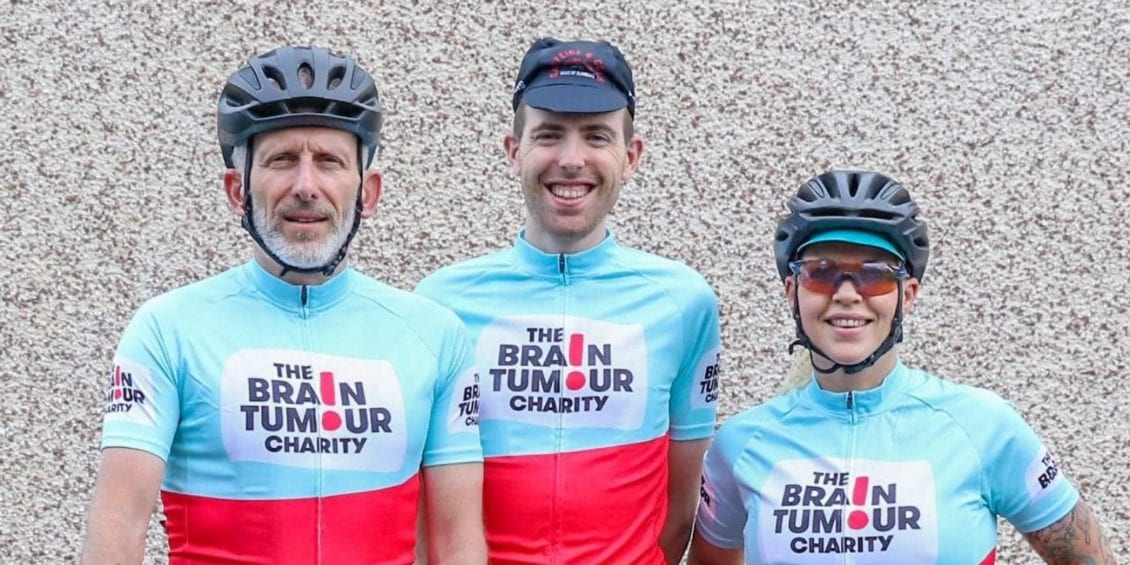University of Wales Trinity Saint David (UWTSD) senior lecturer Dr Darrel Williams, is about to take on a 500km cycling challenge to raise funds and awareness of The Brain Tumour Charity
The Charity is supporting his daughter Daisy, who has been diagnosed with a grade 2 Astrocytoma brain tumour.
On June 12, Dr Darrel Williams from the University’s Centre for Childhood, Youth and Education, will cycle from Lloughor Castle to Carnarvon Castle and back in 24 hours.
Daisy, who graduated from UWTSD with a first-class honours degree in Sport and Exercise Science last year, is a keen cyclist and her cycling family have committed to fundraising activities for the charity, an organisation which has been very supportive for Daisy and which has also seen a massive reduction in funding because of the pandemic.
Darrel will be joined on his epic challenge by friends Mandy Lane, who teaches Sculpture at Coleg Sir Gar and Ed Laverack, who is a pro-cyclist turned coach. They are all part of Bynea Cycling Club which is supporting The Brain Tumour Charity.
Darrel, from Swansea, said: “We have a fundraising target of £2,000 and we are immensely grateful for any contributions, no matter how small. The team will press on with training and are inspired by the encouragement, support and love we all have for Daisy.”
“There are lots of good causes, we wanted to take on a challenge that was meaningful for our community. Daisy has taken part in some very challenging events herself including cycling up Mont Ventoux three times in 24 hours.
“As a team we wanted to take on a challenge which would honour that spirit.”
The team are well aware of the extreme nature of the challenge that lies ahead and have been training for months to get them into peak fitness.
“During every long event there are times when you feel good and times when you feel less good. That is where strength in numbers comes in, there will be friends and family joining the ride at various points.
“The toughest times will probably be during the small hours of the night when the body wants to go to sleep and also the last section of the ride, from Aberystwyth. That section is hilly and of course we will be most fatigued.
“In my mind will be that we can pause to rest, while Daisy is unable to rest from her battle. That will give us strength to push on during the tough times.”
Darrel said Daisy’s symptoms started in September 2018, when she was 23 years old – forgetting how to start her car, turning on a tap or how to write a text.
“Daisy began worrying about her nutrition; obsessing over whether she was eating enough food and even avoiding situations where she might feel faint and weak. Daisy saw her GP to explain her symptoms and was told to take better care of herself and to eat more regularly. Daisy felt that this wasn’t normal.
“Over the next few months Daisy had regular absences in which her mind would go into a daze, often coupled with an intense feeling of fear and inability to speak. Daisy became worried about social situations and whether she would have an absence when speaking to someone, as she knew she would be unable to communicate.
“In February 2019, Daisy experienced two tonic-clonic seizures, which are what most people think of when they think of a seizure. She was unresponsive, shaking and convulsing. Unbeknown to her, Daisy had been having seizures for the previous nine months, but they had been absences; “a loss in your surroundings for a short period of time”. This was horrific for a sportsperson, Daisy felt as if her body was giving up.
“We found out on February 27 that Daisy had a brain tumour. Finally, an answer for why Daisy had been so fatigued, experiencing the horrible symptoms associated with the seizures; a large mass growing inside her brain.
“Months of testing and MRI scans around the UK led to Daisy having the surgery on August 23, 2019, an awake craniotomy, which involved Daisy being awake for three hours. What an ordeal for a young person. The surgery was a success, thanks to the amazing team at Cardiff Heath Hospital.
“After recovering and completing her degree at the same time, Daisy is moving on with her life. Radio therapy is completed, a year of chemotherapy is just beginning.
“As many others have unfortunately experienced, the COVID-19 pandemic has introduced additional stress and complication to an already very challenging time.
“Daisy’s situation of becoming so ill, of correct diagnosis taking such a while, of treatment being such a drawn-out process has raised the awareness of our family and community. Daisy is keen on raising awareness of GPs that they are often on the front line of detecting brain tumours and just because someone is young, and fit doesn’t mean that this dreadful disease can’t be what is causing their symptoms.”
Tom Horsfield, community fundraiser for The Brain Tumour Charity, said: “We are extremely grateful for all the efforts made by our fantastic fundraisers and thank them very much.
“We are leading the way in changing this and truly fighting brain tumours on all fronts through our work.
“We receive no government funding and rely 100% on voluntary donations, so it’s only through the efforts of people like Darrel and his friends, that we can bring hope to the thousands of people who are diagnosed with a brain tumour every year.”
The Brain Tumour Charity is the UK’s largest dedicated brain tumour charity, committed to fighting brain tumours on all fronts.
The organisation funds pioneering research to increase survival and improve treatment options, as well as raising awareness of the symptoms and effects of brain tumours to bring about earlier diagnosis.








Leave a Reply
View Comments